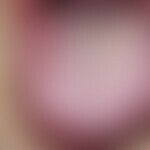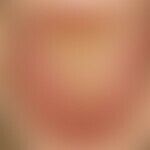Synonym(s)
DefinitionThis section has been translated automatically.
Self-limiting, chronic exfoliative, superficial epithelial detachments migrating over the mucosa of the tongue and forming anular or polycyclic figures ("wandering rash; wandering plaques").
In rare cases, other sites of the oral cavity may also be affected. These changes are called exfoliatio areata mucosae oris or stomatitis geographica.
Occurrence/EpidemiologyThis section has been translated automatically.
In dental collectives, prevalences between 0.6 and 9.8% are reported. Other prevalence figures are reported as 1 - 3%. No confirmed sex preference (w>m?).
You might also be interested in
EtiopathogenesisThis section has been translated automatically.
Unexplained. Gastric anacidity, gastritis, nutritive factors, and psychogenic, neurohumoral, and genetic factors are discussed.
Combination with lingua plicata is common. This constellation may occur as a partial manifestation of Melkersson-Rosenthal syndrome. Versch. Authors consider the migratory plaques as a precursor stage of lingua plicata.
Glossitis mediana rhombica is considered a variant of wandering plaques.
Also seen in streptococcal infections or candida infections.
Exfoliatio areagta linguae occurs more frequently in patients with pustular psoriasis(Psoriasis pustulosa - Dreyer LN et al. 2012). In this context, the detection of IL36RN gene mutations in individuals with exfoliatio areata linguae (and in patients with pustular psoriasis generalisata) is of pathogenetic importance (Liang J et al. 2017).
Furthermore, lingua geographica is a partial manifestation of Reiter's syndrome.
Exfoliatio areata linguae is increasingly observed in Down syndrome.
Not infrequently, migratory plaques are observed as side effects in the context of oral toxicity of tyrosine kinase inhibitors .
ManifestationThis section has been translated automatically.
For toddlers, teenagers and young adults.
Clinical featuresThis section has been translated automatically.
Migratory exfoliation of the uppermost epithelial layer of the tongue mucosa. This results in anular, garland-shaped or also map-shaped, plaque-free (rejection of the hypertrophic papillae of the tongue surface), satin-red (naked) plaques, which are bordered by a raised and whitish swollen, ragged edge. After a latency period of several months, the rejected papillae regenerate again. The tongue surface appears normal again. Possibly burning of the tongue. Not infrequently, lingua geographica is associated with lingua plicata, also as partial manifestations of Melkersson-Rosenthal syndrome.
HistologyThis section has been translated automatically.
Epithelial narrowing in the center of the foci, epithelial widening in the peripheral area. Edema, inflammatory cell infiltrates with numerous epitheliotropic neutrophilic granulocytes, rarely spongiform pustules are detectable; atrophy of elastic fibers.
Differential diagnosisThis section has been translated automatically.
TherapyThis section has been translated automatically.
Not required, clarification of harmlessness of the finding. In case of burning sensations, mouth rinses with chamomile extract (Kamillosan), salviathymol or dexpanthenol R066.
Avoidance of highly spiced foods, citrus fruits, pineapple.
If strep or candida is detected, antimicrobial treatment.
Good success has been achieved with topically applied tacrolimus (Purani JM et al 2014).
Progression/forecastThis section has been translated automatically.
Although harmless, the disease is extremely annoying and characterized by occasional tongue burning. Spontaneous healings are frequent, lifelong persistence is possible.
LiteratureThis section has been translated automatically.
- Ching V et al (2012) Increased prevalence of geographic tongue in burning mouth complaints: a retrospective study. Oral Surg Oral Med OralPathol Oral Radiol 114:444-448.
- Dreyer LN et al (2012) Oral manifestations of psoriasis. Clinical presentationand management. N Y State Dent J 78:14-18
- Gupta T et al (2014) Medical image. A benign glossal lesion. Geographic tongue.N Z Med J 127:88-90
- Jainkittivong A et al (2005): Geographic tongue: clinical characteristics of 188 cases. J Contemp Dent Pract 6:123-135.
- Pass B et al (2005) Geographic tongue: literature review and casereports. Dent Today 54: 56-57
- Prinz H (1927): Wandering rash of the tongue. The Dental Cosmos 69 (4):272-275
Purani JM et al (2014) Treatment of geographic tongue with topical tacrolimus. BMJ Case Rep 2014:bcr-2013-201268.
- Sibaud V et al (2014) Oral toxicity of targeted anticancer therapies. Ann Dermatol Venereol 141:354-363
- Tarakji B et al.(2014) Relation between psoriasis and geographic tongue. J Clin Diagn Res 8: ZE06-07.
Incoming links (21)
Acrodermatitis continua suppurativa; Deficiency of IL-36 receptor antagonist ; Dexpanthenol solution 5% (nrf 7.3.); Exfoliatio linguae et mucosae oris; Exfoliation areata dolorosa; Exfoliative linguae et mucosa oris; Exfoliatives areata dolorosa; Exudative glossitis areata; Glossary; Glossitis exfoliativa marginata; ... Show allOutgoing links (12)
Dexpanthenol; Dexpanthenol solution 5% (nrf 7.3.); Glossitis; Glossitis rhombica mediana; IL36RN gene; Lingua plicata; Melkersson-rosenthal syndrome; Psoriasis pustulosa; Pustular psoriasis; Reiter's syndrome; ... Show allDisclaimer
Please ask your physician for a reliable diagnosis. This website is only meant as a reference.
















